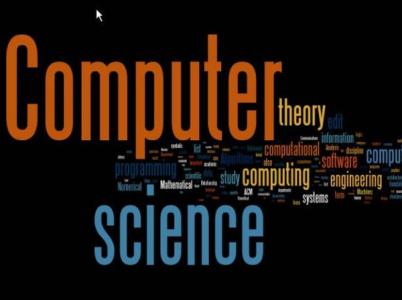学习计算机科学computer-science的 6个理由
对于那些学习计算机科学的同学来说,以下是大学或者出国留学攻读计算机科学(简称"CS")的6个令人信服的理由:
数字信息时代需要计算机科学家
不管你是否喜欢它,你都生活在这里 – 这就是数字时代。计算机程序几乎渗透到我们生活的方方面面。计算机科学家为我们日常使用的程序理论,设计,开发和应用软件和硬件 – 日常生活中我们必不可少,
我们举个例子手机:(基站,wifi,应用,操作系统等等。),不仅如此连我们点外卖可能都会用到它。
计算机科学专业的学生有很好的毕业前景
查看一般计算机拥有的学科,这里并不完整,每个大学的课程并不一样,但是基本都差不多。
1110: Introduction to Computing Using Python
(简介:研究了基本的编程概念和问题分析。使用适当的高级编程语言。具有以前编程经验的学生和不打算参加CS 111x的学生不应参加此课程。)
1112: Introduction to Computing Using MATLAB
简介:使用Python编程和解决问题。强调软件开发,样式和测试的原则。主题包括过程和函数,迭代,重复,数组和向量,字符串,过程和函数调用的操作模型,算法,异常,面向对象的编程和GUI(图形用户界面)。每周实验室在计算机上提供指导练习,工作人员在场提供帮助。作业使用图形和GUI来帮助提高流利度和理解力。
1114: Introduction to Computing Using MATLAB and Robotics
简介:使用MATLAB编程和解决问题。强调算法和程序的系统开发。主题包括迭代,函数,数组,递归,面向对象编程和MATLAB图形。分配旨在建立对复杂性,维度,模糊数据,不精确算术,随机性,模拟和近似作用的理解。
1115: Introduction to Computational Science and Engineering Using Matlab Graphical User Interfaces
简介:使用MATLAB编程和解决问题。强调算法和程序的系统开发。主题包括迭代,函数,数组和MATLAB图形。分配旨在建立对复杂性,维度,模糊数据,不精确算术,随机性,模拟和近似作用的理解。速度比(Introduction to Computing Using MATLAB)更快。每项任务都涉及图形用户界面的设计,并突出了计算科学和工程的重要方面。
1130: Transition to Object-Oriented Programming
简介:使用Java介绍面向对象的概念。假设使用MATLAB,C,C ++或Fortran等语言编程知识。
1132: Short Course in MATLAB
简介:MATLAB编程语言简介。涵盖了MATLAB的基本编程结构,包括赋值,条件,迭代,函数,数组,矢量化计算和科学图形。专为需要MATLAB进行研究或其他课程的学生而设计。不承担任何以前的编程经验。
1133: Short Course in Python
简介:Python编程语言简介。介绍Python的基本编程结构,包括赋值,条件,迭代,函数,面向对象设计,数组和向量化计算。专为需要Python进行研究或其他课程的学生而设计。不承担任何以前的编程经验。
1300: Introductory Design and Programming for the Web
简介:学习一些网页设计相关知识,比如PHP,nodejs,Html,css等等。
1305: Computation and Culture in a Digital Age
通过讨论,辩论和写作,本课程探讨了计算和信息科学在科学,医学,艺术,商业和娱乐等领域的快速发展所带来的回报,挑战和机遇。它从法律,历史和文化的角度探讨了该领域的思想和技术及其在社会中的作用。学生将了解以用户为中心的网站设计开发生命周期,重点是评论和可用性测试。学生接触到人工智能的一些基础,并通过操纵数字媒体来学习基本的计算机编程概念。
1380: Data Science for All
本课程介绍数据科学。根据从互联网居民,调查受访者或无线传感器收集的经济学,医学,生物学或物理学的数据,如何理解产生数据,做出预测和改进决策的现象?我们专注于在推理思维和计算思维方面培养技能,并以我们寻求回答的实际问题为指导。该课程教授计算机编程和统计推理中的关键概念和技能,并结合实际数据集的实际分析,包括经济数据,文档集,地理数据和社交网络。
1610: Computing in the Arts
几个世纪以来,各种媒体中的艺术家都采用了许多创作过程,从哲学到机械到虚拟。本课程揭示了用于艺术和音乐的软件内部的一些谜团。它探讨了将事物分开,抽样以及将事物放在一起并重新合成的方法,以及探索创造的想法。本课程不教授用于创作艺术和音乐的软件包。
1620: Visual Imaging in the Electronic Age
计算机成像,视觉,可以通过计算机处理一些图片,或者识别一些图片,对图片做出一些难以置信的处理技术。
1710: Introduction to Cognitive Science
科学导论,介绍计算机导论,理论知识比较多。
1810: Topics in the Analysis and Transmission of Knowledge and Information
知识和信息之间的区别在于哲学领域,但在当前高度网络化的计算机媒介世界中,嘈杂的数据和嘈杂的通信无处不在。本课程探讨了在人 – 人,人 – 计算机和计算机 – 计算机三种环境中传输内容和提取信息的相关问题。我们还探讨了当我们从一对一通信转向多对多环境时,问题的本质如何发生变化。
1998: Freshmen and Nontechnical Team Projects
新生和非技术团队项目。
2024: C++ Programming
C ++编程语言和C / C ++标准库的中级介绍。主题包括基本陈述,声明和类型; 流I / O; 用户定义的类和类型; 派生类,继承和面向对象编程; 例外和模板。推荐给计划参加计算机科学高级课程且需要熟悉C ++或C的学生。
2043: UNIX Tools and Scripting
UNIX和类UNIX系统越来越多地用于个人计算机,移动电话,Web服务器和许多其他系统。它们代表了一个美妙的编程环境家族,对计算机科学家和许多其他领域的人们都有用,例如计算生物学和计算语言学,其中数据自然地由字符串表示。本课程将学生从shell基础知识和管道,到正则表达式处理工具,到shell脚本和Python。其他主题包括处理并发和远程资源,操作流和文件以及管理软件安装。
2049: Intermediate iPhone Development
本课程通过实践方法介绍iOS开发中的中级主题。在每个讲座中,学生与讲师一起开发应用程序。涵盖的主题包括AVFoundation(音频和视频框架,包括视频捕获),SpriteKit,CoreLocation,Persistence和多线程应用程序开发。
2110: Object-Oriented Programming and Data Structures
高级语言的中级编程和计算机科学的介绍。主题包括面向对象的编程(类,对象,子类,类型),图形用户界面,算法分析(渐近复杂性,大“O”符号),递归,测试,程序正确性(循环不变量),搜索/排序,数据结构(列表,树,堆栈,队列,堆,搜索树,哈希表,图表),图算法。Java是主要的编程语言。
2111: Programming Practicum
与CS 2110合作,每周会面一小时。旨在增强对面向对象编程的理解,使用应用程序编写Java程序,以及其他编程问题,以及CS 2110中出现的理论概念。小时花费的方式与研究中的材料相适应 – 选择,问答环节,小组解决问题,一对一帮助等。
2112: Object-Oriented Design and Data Structures – Honors
中级软件设计和关键计算机科学思想的介绍。主题类似于CS 2110中的主题 但是更深入,更具挑战性的任务。主题包括面向对象编程,程序结构和组织,使用规范和不变量的程序推理,递归,设计模式,并发编程,图形用户界面,CS 2110中的数据结构,排序和图算法,渐近复杂度和简单算法分析。Java是主要的编程语言。
2300: Intermediate Design and Programming for the Web
先决条件,Web中级编程
2770: Excursions in Computational Sustainability
先修课程:学生应具备概率论和微积分的基础知识
2800: Discrete Structures
2850: Networks
3110: Data Structures and Functional Programming
3152: Introduction to Computer Game Architecture
3300: Data-Driven Web Applications
3410: Computer System Organization and Programming
3420: Embedded Systems
3758: Autonomous Mobile Robots
4090: Teaching Experience in Computer Science
4110: Programming Languages and Logics
4120: Introduction to Compilers
4121: Practicum in Compilers
4152: Advanced Topics in Computer Game Architecture
4154: Analytics-driven Game Design
4210: Numerical Analysis and Differential Equations
4220: Numerical Analysis: Linear and Nonlinear Problems
4300: Language and Information
4320: Introduction to Database Systems
4321: Practicum in Database Systems
4410: Operating Systems
4411: Practicum in Operating Systems
4420: Computer Architecture
4450: Introduction to Computer Networks
4620: Introduction to Computer Graphics
4621: Computer Graphics Practicum
4654: Virtual Reality Design
4670: Introduction to Computer Vision
4700: Foundations of Artificial Intelligence
4701: Practicum in Artificial Intelligence
4732: Social and Ethical Issues in AI
4740: Natural Language Processing
4744: Computational Linguistics
4750: Foundations of Robotics
4752: Robotic Manipulation
4754: Human Robot Interaction – Research and Design
4758: Robot Learning
4775: Computational Genetics and Genomics
4780: Machine Learning for Intelligent Systems
4786: Machine Learning for Data Science
4810: Introduction to Theory of Computing
4812: Quantum Information Processing
4814: Introduction to Computational Complexity
4820: Introduction to Analysis of Algorithms
4830: Introduction to Cryptography
4850: Mathematical Foundations for the Information Age
4852: Networks II: Market Design
4860: Applied Logic
4998: Team Projects
4999: Independent Reading and Research
5094: Introduction to Blockchains, Cryptocurrencies, and Smart Contracts
5110: Programming Languages and Logics
5112: Algorithms and Data Structures for Applications
5114: Network Programming Languages
5120: Introduction to Compilers
5121: Practicum in Compilers
5150: Software Engineering
5152: Open-Source Software Engineering
5220: Applications of Parallel Computers
5223: Numerical Analysis: Linear and Nonlinear Problems
5300: The Architecture of Large – Scale Information Systems
5304: Data Science in the Wild
5306: Crowdsourcing and Human Computation
5320: Introduction to Database Systems
5321: Practicum in Database Systems
5412: Cloud Computing
5413: High Performance Systems and Networking
5414: Distributed Computing Principles
5420: Advanced Computer Architecture
5424: Developing and Designing Interactive Devices
5430: System Security
5431: Practicum in System Security
5433: Blockchains, Cryptocurrencies, and Smart Contracts
5434: Defending Computer Networks
5435: Security and Privacy Concepts in the Wild
5436: Privacy in the Digital Age
5437: Principals and Practice of Cryptocurrencies
5439: Practicum in Computer Security
5450: Networked and Distributed Systems
5540: Computational Techniques for Analyzing Clinical Data
5555: Health Tech, Data, and Systems
5620: Introduction to Computer Graphics
5621: Computer Graphics Practicum
5625: Interactive Computer Graphics
5643: Physically Based Animation for Computer Graphics
5650: Virtual and Augmented Reality
5660: Signal Processing
5670: Introduction to Computer Vision
5682: HCI and Design
5724: Evolutionary Computation
5726: Learning and Decision Making
5727: Optimization Methods
5740: Natural Language Processing
5750: Foundations of Robotics
5752: Robotic Manipulation
5780: Machine Learning for Intelligent Systems
5785: Applied Machine Learning
5786: Machine Learning for Data Science
5830: Cryptography
5831: Security Protocols and Privacy
5846: Decision Theory I
5854: Networks and Markets
5860: Introduction to Formal Methods
5998: Master of Engineering Internship
5999: Master of Engineering Project
6110: Advanced Programming Languages
6113: Language-Based Security
6114: Network Programming Languages
6115: Certified Software Systems
6117: Category Theory for Computer Scientists
6118: Types and Semantics
6180: Introduction to Constructive Type Theory
6210: Matrix Computations
6220: Data-Sparse Matrix Computations
6241: Numerical Methods for Data Science
6320: Advanced Database Systems
6360: Educational Technology
6410: Advanced Systems
6411: Systems Principles
6431: Security and Privacy Technologies
6432: Distributed Consensus and Blockchains
6450: Advanced Computer Networking
6452: Datacenter Networks and Services
6453: Big Data Systems: Trends and Challenges
6465: Emerging Cloud Technologies and Systems Challenges
6466: Cryptocurrencies and Smart Contracts
6630: Realistic Image Synthesis
6640: Computational Photography
6644: Recognizing and Modeling the World
6650: Computational Motion
6670: Computer Vision
6700: Advanced Artificial Intelligence
6740: Advanced Language Technologies
6741: Structured Prediction for Natural Language Processing
6742: Natural Language Processing and Social Interaction
6751: Introduction to Robotic Mobile Manipulation
6756: Advanced Topics in Robot Learning: 3D Perception
6758: Robot Learning
6764: Reasoning about Knowledge
6766: Reasoning about Uncertainty
6780: Advanced Machine Learning
6783: Machine Learning Theory
6784: Advanced Topics in Machine Learning
6787: Advanced Machine Learning Systems
6788: Advanced Topic Modeling
6810: Theory of Computing
6815: Pseudorandomness and Combinatorial Constructions
6820: Analysis of Algorithms
6825: The Science Base for the Information Age
6830: Cryptography
6831: Designing Secure Cryptography
6832: Applied Cryptography
6850: The Structure of Information Networks
6860: Logics of Programs
6861: Introduction to Kleene Algebra
7090: Computer Science Colloquium
7190: Seminar in Programming Languages
7192: Seminar in Programming Refinement Logics
7290: Seminar on Scientific Computing and Numerics
7390: Database Seminar
7490: Systems Research Seminar
7493: Computer Security Seminar
7594: Seminar on Computational Issues in Health and Medicine
7670: Special Topics in Computer Vision
7690: Computer Graphics Seminar
7790: Seminar in Artificial Intelligence
7792: Special Topics in Machine Learning
7794: Seminar in Natural Language Understanding
7796: Robotics Seminar
7890: Seminar in Theory of Algorithms and Computing
7893: Cryptography Seminar
7999: Independent Research
9999: Thesis Research
以上是一般大学使用的课程。特别提醒:英国的硕士可以提前到一年修完,你可以选择英国的硕士专业。
计算机科学家可以获得更多的薪水
计算机科学家需求很大,他们的工资反映了这一点。计算机科学毕业生平均收入比其他学科的都要高出很多 – 而且他们的薪水是逐年增长。
每个行业对计算机科学的应用都很广泛
每个行业都使用计算机,所以计算机科学家可以在科学,工程,生物,医疗,保健,金融以及许多其他领域的问题都可以通过计算机去更好更快的解决问题。通过计算机科学家的程式如何应用解决方案并设计软件编程。
5.国际多元化队列
计算机科学系通常可以从各自的大学中获得一个文化多样化的圈子。根据有关数据表明,近20,000名计算机科学专业的同学来自海外。
多元化的群体意味着您将接触到不同的文化及不同的领域,并可能通过国际联系网络完成大学,以便在以后的生活中使用。
6.海外就业的机会
计算机已走向全球化,计算机科学教育提供者不反映这一事实是愚蠢的。检查您感兴趣的课程的海外学习机会。在国外学习一年将使您更深入地了解计算机在世界各地的使用情况,让您体验其他文化,并在此过程中获得一些语言技能。
代写CS&Finance|建模|代码|系统|报告|考试
编程类:C代写,JAVA代写 ,数据库代写,WEB代写,Python代写,Matlab代写,GO语言,R代写
金融类:统计,计量,风险投资,金融工程,R语言,Python语言,Matlab,建立模型,数据分析,数据处理
服务类:Lab/Assignment/Project/Course/Qzui/Midterm/Final/Exam/Test帮助代写代考辅导
天才写手,代写CS,代写finance,代写statistics,考试助攻
E-mail:[email protected] 微信:BadGeniuscs 工作时间:无休息工作日-早上8点到凌晨3点
如果您用的手机请先保存二维码到手机里面,识别图中二维码。如果用电脑,直接掏出手机果断扫描。


